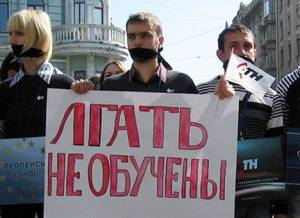After Kharkiv’s TV ATN who’s the next target?
If Ukraine’s leaders believed that the two-week break in Yulia Tymoshenko’s trial would avert criticism at the Eighth Ukraine and the World Forum in Yalta, they were mistaken. Stern noises were heard from Friday on, with fairly unequivocal warnings that imprisonment of the former Prime Minister would gravely damage Ukraine’s prospects for European integration.
Tymoshenko’s prosecution and detention are undoubtedly flagrant violations of fundamental principles of democracy. They are categorically not the only ones committed by the current regime, and hurried efforts to remove a Soviet-age article of the Criminal Code in order to avert Tymoshenko’s conviction cannot be all that the EU demands. There are a number of others, including former government officials, facing prosecution on equally dubious grounds. It is impossible to see any justification for the continued detention of former Minister of Internal Affairs Yury Lutsenko and former Acting Defence Minister Valery Ivashchenko , to name but two.
There is no place for selective justice in a democracy. Selective indignation could also create the wrong impression.
This does not apply only to flawed and politically motivated prosecutions. A key element of any democracy is freedom of speech and access to information. Manipulation of information is, brutally speaking, more efficient than heavy-handed force, and no less dangerous.. The hard-hitting words spoken at the meeting in Yalta have largely filtered back to the Ukrainian Internet via western information agencies. The State-owned and taxpayer-funded UTV1 gave an upbeat report from the first day of the meeting. Of particular interest were the words from EU Enlargement Commissioner Stefan Fule about the considerable progress made towards an EU- Ukraine Association Agreement. Of interest, as is increasingly the case with Ukrainian television, because of what was not reported. Unlike Reuters, the BBC and other agencies, Ukrainian television preferred to omit clear statements from the same Mr Fule regarding the damage to relations which the trial and arrest of Yulia Tymoshenko is causing. The Ukrainian version of Euronews left out the conference altogether. One can hope that the Euronews team has reason for assuming that Ukrainian viewers are more interested in a meeting of Eurozone Ministers of Finance in Wrocław (Poland) than issues which could make or break the EU-Ukraine Association. On the other hand, the serious flaws in the presentation of opposition protest on Independence Day, the day Euronews in Ukrainian was launched, would suggest a closer link with UTV-1 than can be considered appropriate.
The arrest of the President’s main opponent jeopardizes Ukraine’s democratic development. So too does a population deprived of the ability to make informed judgements about Ukraine’s leaders and any possible harm they are doing the country.
Pressure from EU bodies here is also vital. They could begin by addressing a situation with grave implications for freedom of speech in one of the cities – Kharkiv – hosting Euro 2012 in less than a year. For 18 years TV ATN has provided quality news reporting to the region. Last week, ATN and two channels broadcasting its news – Fora and ATVK – found themselves taken off air. Various garbled and suspiciously varied pretexts have been provided for what was effectively the simultaneous cutting of the three channels providing news coverage critical of Kharkiv’s Mayor Gennady Kernes. The latter, together with his wife, basically own the other channels in Kharkiv.
The Ukrainian Helsinki Human Rights Union and Kharkiv Human Rights Group have reiterated concern expressed by the channels themselves. This move could deprive Kharkiv residents of a vital opportunity to be informed about all that the authorities are doing, not simply that which the Mayor wants them to know.
In an interview regarding this latest assault on freedom of speech, the question was asked over and over again: who will be next? It is not clear whether the central authorities, the President and his Administration were aware of the events in Kharkiv. Nor indeed is there direct proof of any official’s political or other motives. However three important sources of information have been stifled and there can be no doubt that intervention is needed.. Judging by the overtly pro-regime slant of Ukraine’s State-owned channel, it seems safe to assume that only serious pressure will force those who wield real power in the country to use it properly. Such pressure from the European Union will cost considerably less than the 22 million recently pledged for the development of democracy in Ukraine. It will be no less efficacious.
From a picket by ATN and others of the Mayor’s Office (the caption reads “Not trained to lie”))






